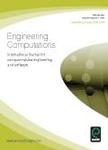版权所有:内蒙古大学图书馆 技术提供:维普资讯• 智图
内蒙古自治区呼和浩特市赛罕区大学西街235号 邮编: 010021

作者机构:Tongji Univ State Key Lab Disaster Reduct Civil Engn Shanghai Peoples R China Tongji Univ Res Inst Struct Engn & Disaster Reduct Shanghai Peoples R China
出 版 物:《ENGINEERING COMPUTATIONS》 (工程计算)
年 卷 期:2018年第35卷第7期
页 面:2480-2501页
核心收录:
学科分类:08[工学] 0701[理学-数学] 0812[工学-计算机科学与技术(可授工学、理学学位)] 0801[工学-力学(可授工学、理学学位)]
基 金:Ministry of Science and Technology of China [SLDRCE14-B-03] National Natural Science Foundation of China
主 题:Differential evolution algorithm Epistemic uncertainty Evidence theory Park-Ang damage model Performance-based seismic design
摘 要:Purpose This paper aims to develop a comprehensive uncertainty quantification method using evidence theory for Park-Ang damage index-based performance design in which epistemic uncertainties are considered. Various sources of uncertainty emanating from the database of the cyclic test results of RC members provided by the Pacific Earthquake Engineering Research Center are taken into account. Design/methodology/approach In this paper, an uncertainty quantification methodology based on evidence theory is presented for the whole process of performance-based seismic design (PBSD), while considering uncertainty in the Park-Ang damage model. To alleviate the burden of high computational cost in propagating uncertainty, the differential evolution interval optimization strategy is used for efficiently finding the propagated belief structure throughout the whole design process. Findings The investigation results of this paper demonstrate that the uncertainty rooted in Park-Ang damage model have a significant influence on PBSD design and evaluation. It might be worth noting that the epistemic uncertainty present in the Park-Ang damage model needs to be considered to avoid underestimating the true uncertainty. Originality/value This paper presents an evidence theory-based uncertainty quantification framework for the whole process of PBSD.